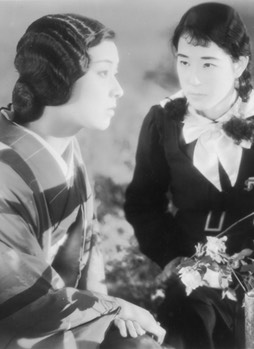News and Opinion
Conversations in Silence 2: Fukujuso and Queer Japanese Cinema in the 1930s
I reported on the first edition of Conversations in Silence back in April. On June 11, we held the second session at Haremame, again with Kataoka Ichiro serving as benshi and Kikuchi Naruyoshi deejaying music. This time the theme was “LGBT” and we showed a rare and fascinating film made by Shinko Kinema in 1935 entitled Fukujuso (director: Kawate Jiro). The film was released as a “sound-ban,” which means it had music and possibly sound effects on the sound track, but the sound no longer exists, so we showed it as a silent film. It is based on one of the stories in Yoshiya Nobuko’s Hana monogatari, and was the first of a couple films made at the time using that work. What was so interesting about the film was that it appears to strongly depict the love between two women.

Often considered a pioneer of shojo shosetsu, Yoshiya has garnered much interest recently, as her stories narrated in elegant Japanese of the friendships of young women, often in boarding schools, have been interpreted through queer readings as explorations of lesbian sexuality. In the United States, for instance, Sarah Frederick at Boston University has been writing on and translating Yoshiya’s literature (here is one essay).

